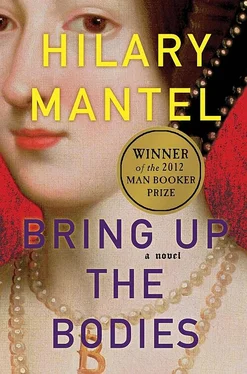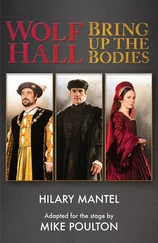Anne says, ‘How does she dare? Why does she even think she can negotiate? If my child is a boy, I know what will happen to her. She had better make her peace with her father now, not come crying to him for mercy when it is too late.’
‘It’s good advice,’ he says. ‘I doubt she will take it.’
‘Then I can do no more.’
‘I honestly think you cannot.’
And he does not see what more he can do for Anne Boleyn. She is crowned, she is proclaimed, her name is written in the statutes, in the rolls: but if the people do not accept her as queen…
Katherine’s funeral is planned for 29 January. The early bills are coming in, for the mourning attire and candles. The king continues elated. He is ordering up court entertainments. There is to be a tournament in the third week of the month and Gregory is down as a contestant. Already the boy is in a sweat of preparation. He keeps calling in his armourer, sending him off and calling him back again; changing his mind about his horse. ‘Father, I hope I am not drawn against the king,’ he says. ‘Not that I fear him. But it will be hard work, trying to remember it is him, and also trying to forget it is him, trying your best to get a touch but please God no more than a touch. Suppose I should have the bad luck to unhorse him? Can you imagine if he came down, and to a novice like me?’
‘I wouldn’t worry,’ he says. ‘Henry was jousting before you could walk.’
‘That’s the whole difficulty, sir. He is not as quick as he was. So the gentlemen say. Norris says, he’s lost his apprehension. Norris says you can’t do it if you’re not scared, and Henry is convinced he is the best, so he fears no opponent. And you should fear, Norris says. It keeps you sharp.’
‘Next time,’ he says, ‘get drawn on the king’s team at the start. That avoids the problem.’
‘How would one do that?’
Oh, dear God. How would one do anything, Gregory? ‘I’ll have a word,’ he says patiently.
‘No, don’t.’ Gregory is upset. ‘How would that stand with my honour? If you were there arranging matters? This is something I must do for myself. I know you know everything, father. But you were never in the lists.’
He nods. As you please. His son clanks away. His tender son.
As the New Year begins, Jane Seymour continues her duties about the queen, unreadable expressions drifting across her face as if she were moving within a cloud. Mary Shelton tells him: ‘The queen says that if Jane gives way to Henry he will be tired of her after a day, and if she does not give way he will be tired of her anyway. Then Jane will be sent back to Wolf Hall, and her family will lock her in a convent because she is no further use to them. And Jane says nothing.’ Shelton laughs, but kindly enough. ‘Jane does not feel it would be very different. As she is now in a portable convent, and bound by her own vows. She says, “Master Secretary thinks I would be very sinful to let the king hold my hand, though he begs me, ‘Jane, give me your little paw.’ And as Master Secretary is second only to the king in church affairs, and a very godly man, I take notice of what he says.”’
One day Henry seizes Jane as she is passing and sits her on his knee. It is a sportive gesture, boyish, impetuous, no harm in it; so he says later, excusing himself sheepishly. Jane does not smile or speak. She sits calmly till she is released, as if the king were any joint-stool.
Christophe comes to him, whispering: ‘Sir, they are saying on the streets that Katherine was murdered. They are saying that the king locked her in a room and starved her to death. They are saying that he sent her almonds, and she ate, and was poisoned. They are saying that you sent two murderers with knives, and that they cut out her heart, and that when it was inspected, your name was branded there in big black letters.’
‘What? On her heart? “Thomas Cromwell”?’
Christophe hesitates. ‘ Alors …Perhaps just your initials.’
I.
The Black Book.
London: January–April 1536
When he hears the shout of ‘Fire!’ he turns over and swims back into his dream. He supposes the conflagration is a dream; it’s the sort he has.
Then he wakes to Christophe bellowing in his ear. ‘Get up! The queen is on fire.’
He is out of bed. The cold slices into him. Christophe yells, ‘Quick, quick! She is totally incinderated.’
Moments later, when he arrives on the queen’s floor, he finds the smell of singed cloth heavy in the air, and Anne surrounded by gibbering women, but unhurt, in a chair, wrapped in black silk, with a chalice of warmed wine in her hands. The cup jiggles, spills a little; Henry is tearful, hugging her, and his heir who is inside her. ‘If only I had been with you, sweetheart. If only I had spent the night. I could have put you out of danger in an instant.’
On and on he goes. Thank the Lord God who watches over us. Thank the God who protects England. If only I. With a blanket, a quilt, stifling them. I, in an instant, beating out the flames.
Anne takes a gulp of her wine. ‘It is over. I am not harmed. Please, my lord husband. Peace. Let me drink this.’
He sees, in a flash, how Henry irritates her; his solicitude, his doting, his clinging. And in the depth of a January night she can’t disguise the irritation. She looks grey, her sleep broken. She turns to him, Cromwell, and speaks in French. ‘There is a prophecy that a queen of England will be burned. I did not think it meant in her own bed. It was an unattended candle. Or so one assumes.’
‘By whom unattended?’
Anne shudders. She looks away.
‘We had better take order,’ he says to the king, ‘that water be kept to hand, and one woman be appointed on every rota to check that all lights are extinguished about the queen. I cannot think why it is not the custom.’
All these things are written down in the Black Book, which comes from King Edward’s time. It orders the household: orders everything, in fact, except the king’s privy chamber, whose workings are not transparent.
‘If only I had been with her,’ says Henry. ‘But, you see, our hopes being what they are…’
The King of England cannot afford carnal relations with the woman carrying his child. The risk of miscarriage is too great. And for company he looks elsewhere too. Tonight you can see how Anne’s body stiffens as she pulls away from her husband’s hands, but in daylight hours, their position is reversed. He has watched Anne as she tries to draw the king into conversation. His abruptness, all too often. His turned shoulder. As if to deny his need of her. And yet his eyes follow her…
He is irritated; these are women’s things. And the fact that the queen’s body, wrapped only in a damask nightgown, seems too narrow for that of a woman who will give birth in spring; that is a woman’s thing too. The king says, ‘The fire did not come very near her. It is the corner of the arras that is burned up. It is Absalom hanging in the tree. It is a very good piece and I would like you to…’
‘I’ll get someone over from Brussels,’ he says.
The fire has not touched King David’s son. He hangs from the branches, strung up by his long hair: his eyes are wild and his mouth opens in a scream.
It is hours yet till daylight. The rooms of the palace seem hushed, as if they are waiting for an explanation. Guards patrol through the dark hours; where were they? Should not some woman have been with the queen, sleeping on a pallet at the foot of her bed? He says to Lady Rochford, ‘I know the queen has enemies, but how were they allowed to come so near her?’
Jane Rochford is on her high horse; she thinks he is attempting to blame her. ‘Look, Master Secretary. Shall I be plain with you?’
Читать дальше
Конец ознакомительного отрывка
Купить книгу












